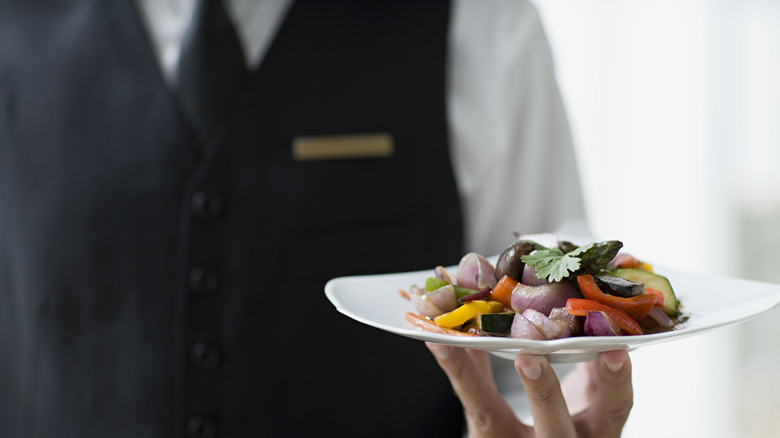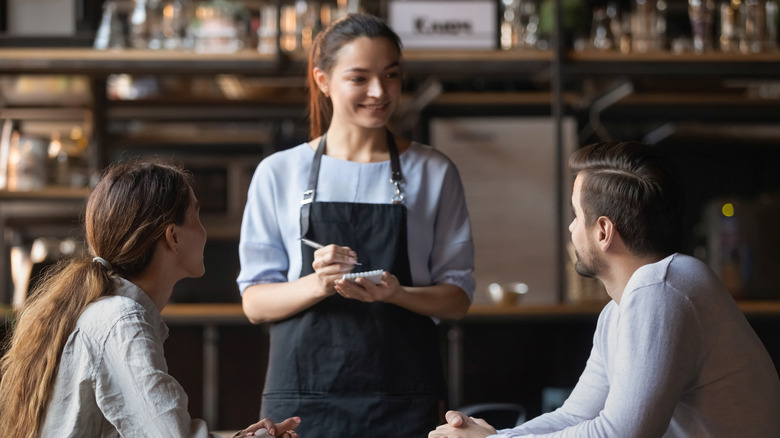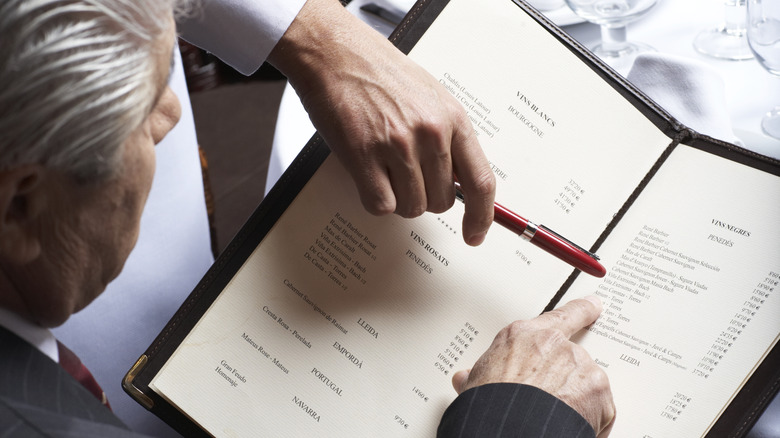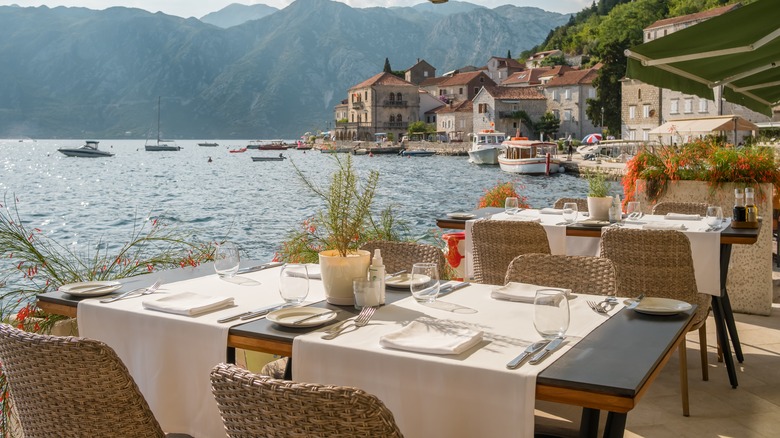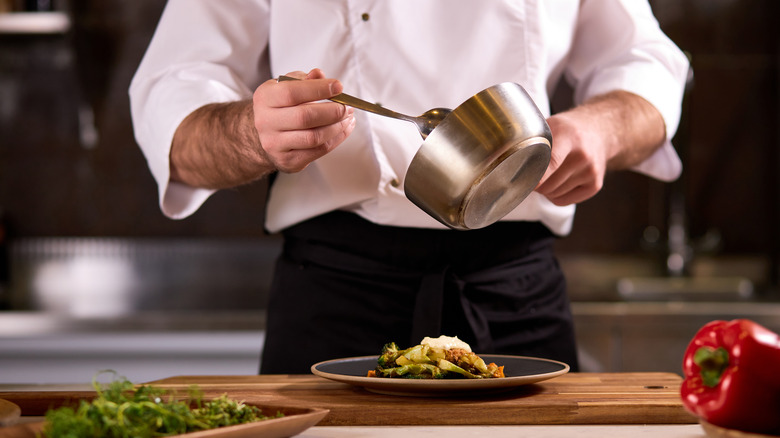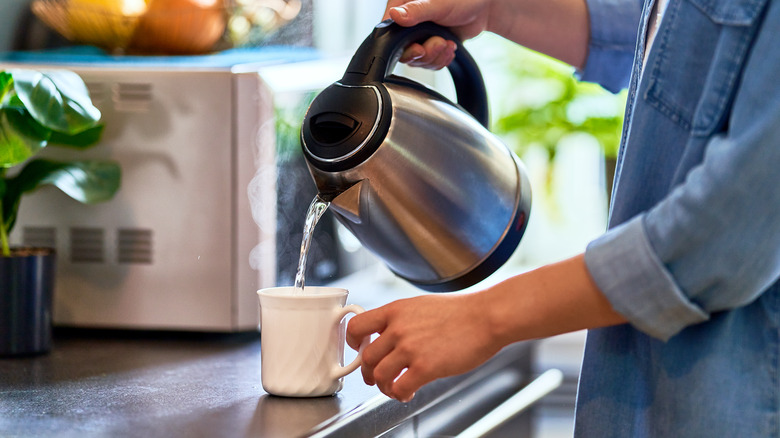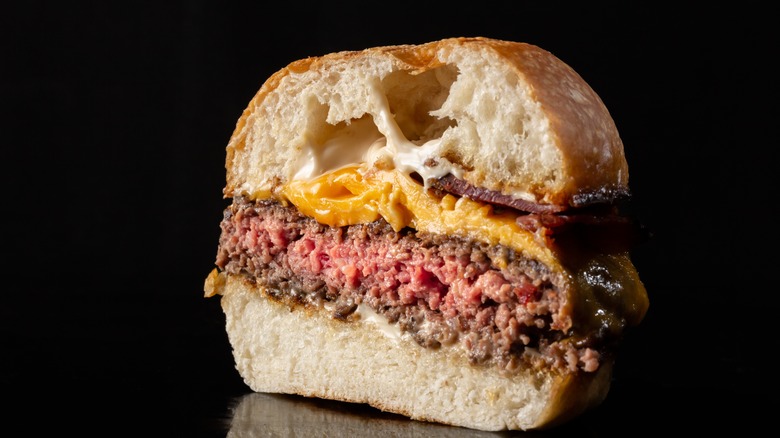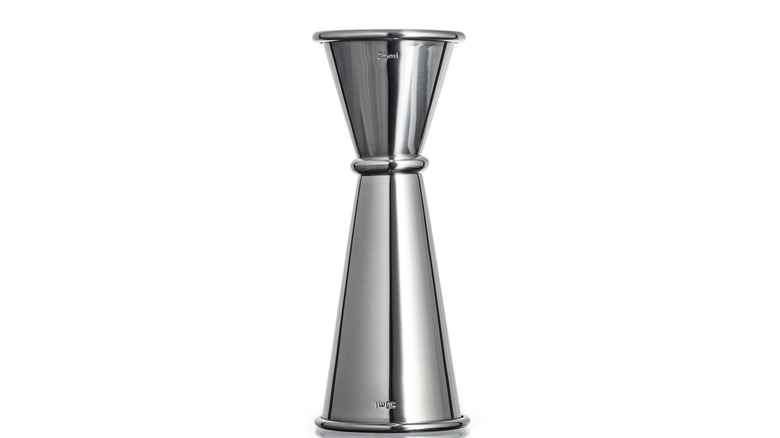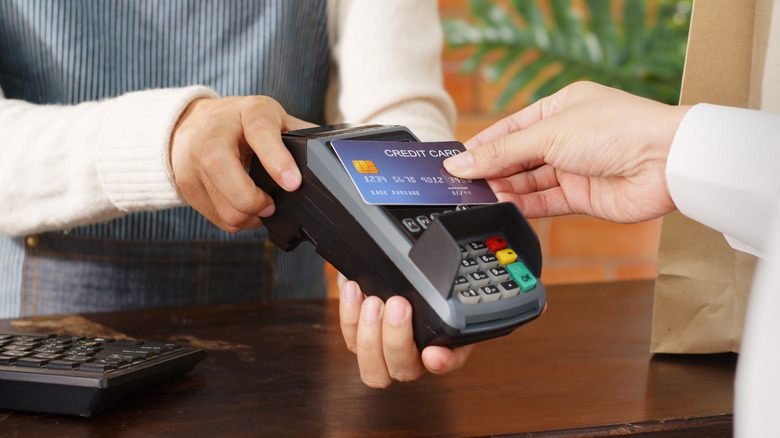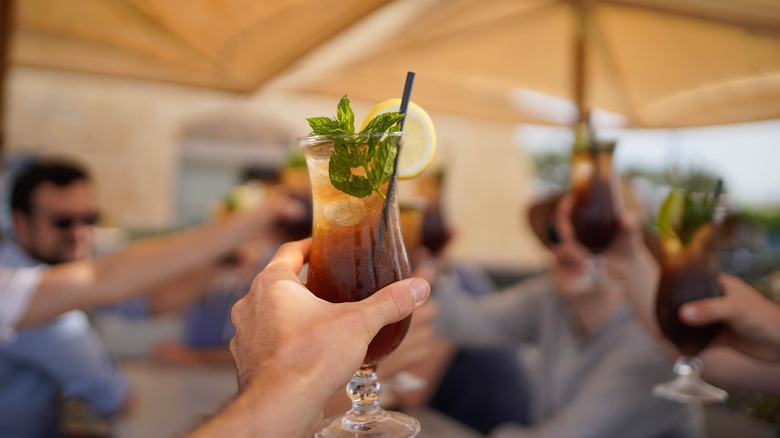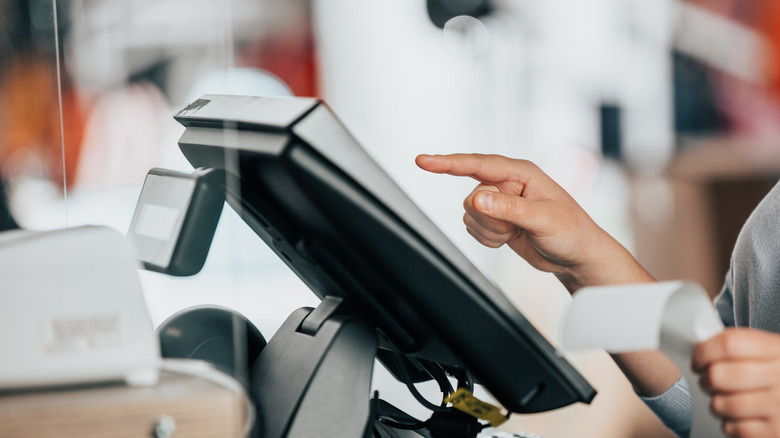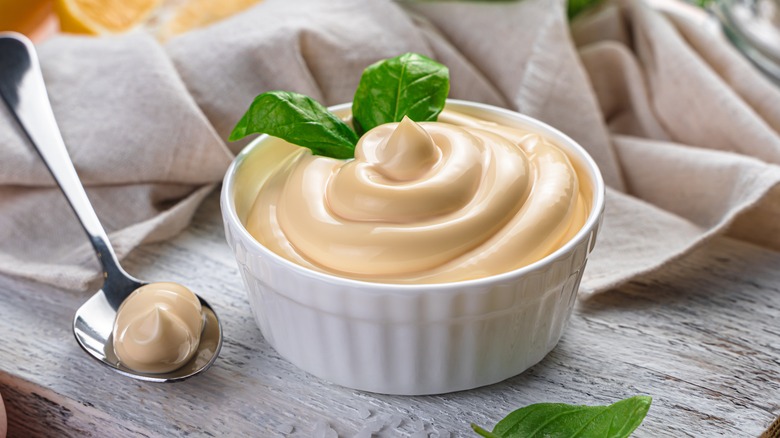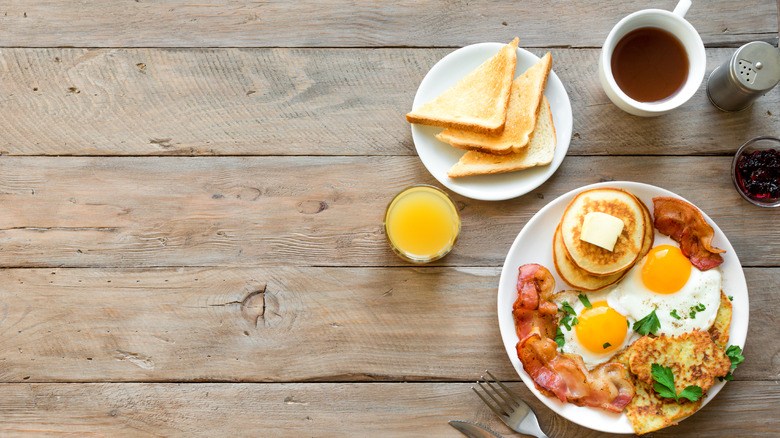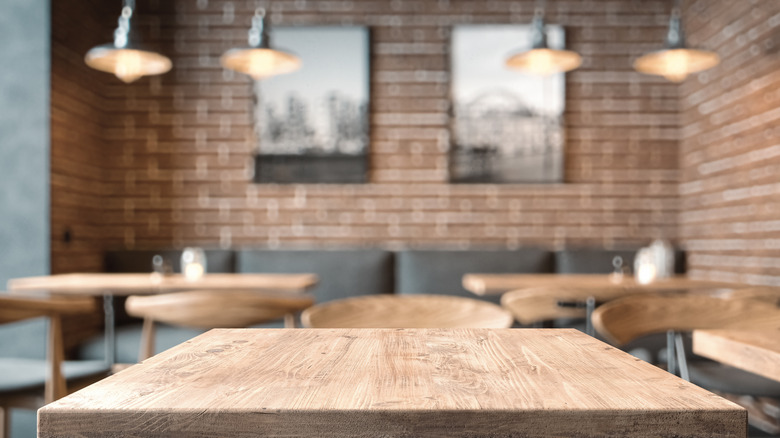17 Questions That Are Red Flags For Servers
If you've ever waited tables, you know it can be a great gig. The job comes with some real perks: free food, fun co-workers, a flexible schedule, and quick money. However, as with most things in life, there are pros and cons to working as a server.
More often than not, the biggest headaches servers face in their day-to-day (or more accurately, night-to-night) lives is having to deal with guests who simply don't understand the proper way to behave in a restaurant — and who pepper them with questions that make their lives harder.
Of course, your server is there to serve you, but that doesn't mean you shouldn't treat them with kindness and respect. This goes beyond simply using your manners. While you should definitely remember to say please when you ask for something, there are also plenty of things you shouldn't do while eating at a restaurant. For starters, here are some common questions that you should avoid asking your server.
What's the cheapest thing on the menu?
First of all, unless you're eating at a fancy restaurant, menus usually include prices — so you can figure out the answer to this on your own. This means asking your server this question not only indicates that you're cheap, but also that can't spare a minute or two to scan the menu without them holding your hand.
Laziness aside, when you're looking for the cheapest thing on the menu, you make your server acutely aware of the fact that you don't want to spend money. If you aren't willing to shell out a few extra dollars to order the entrée you actually want (instead of what happens to be the cheapest), chances are you aren't going to tip very well, either.
To be clear, servers don't expect every table to go all-out and order the highest ticket items on the menu. They respect the fact that people are working within a range of budgets, and that going out to eat can cause financial stress. However, if you are on a tighter budget, just keep it to yourself. If you order within your means, account for taxes and tip as you plan, and are nice to your server, everything will be just fine.
What's good on the menu?
This one might come as a surprise, but essentially, there's a right way and a wrong way to ask your server for recommendations. We're here to tell you that the extremely vague, blanket inquiry of "what's good on the menu" is the wrong way.
Hear us out: What's considered "good" can depend on a wide range of factors. For example, if you're a vegetarian, then the steak isn't going to sound very appealing to you — even if it's the most delicious thing the restaurant serves. Similarly, if you're looking for a few light bites, and a server recommends the heaviest pasta entrée, you're not going to find their advice very useful.
A better way to approach asking your server for recommendations is to provide them with specific parameters. Asking about their favorite appetizer or their most popular sandwich will get you a lot further than expecting them to read your mind (and your appetite, and your dietary restrictions).
Plus, there's a possibility that your server hasn't tried everything, anyways.
Why can't I sit at that table over there?
If there's one thing that drives nearly everyone who works in a restaurant crazy, it's when guests think they know more about the restaurant's operations than they do. So, if you see an empty table, please don't assume that you can sit there. Most restaurants have staff that are hired for the sole purpose of allocating tables to guests (i.e. the host), and we promise they aren't just seating people at random.
Seating is determined based on more factors than most guests realize. Not only do restaurants need to save tables for reservations, but they also need to seat guests in a rotation that makes sense for the servers. If the host puts multiple new tables in one server's section back-to-back, then that server won't be able to take care of everyone in a timely fashion.
All of this is to say that servers rely on the host to handle the seating correctly. They have very little say over who sits where, and if they move one of their tables, it could interfere with the host and their fellow servers being able to perform their jobs properly.
Can the kitchen make me something that's not on the menu?
Unless there is a no substitutions policy, most kitchens don't mind making reasonable modifications — but there is a menu for a reason. Restaurants don't have access to unlimited ingredients. They buy specific items based on what they've decided to serve. If you don't see pasta on the menu, it's not because the restaurant is hiding it from you. It's because it doesn't have it.
Access to ingredients aside, restaurant kitchens are designed to run like well-oiled machines. Absolutely everything is methodized and asking for something off-menu can completely throw off the kitchen crew's workflow.
Servers don't enjoy having to tell guests "no." They strive to provide the best possible dining experience and to make sure you leave full and happy. However, if you request something that just isn't possible, they won't have a choice but to disappoint. Think of it this way, if your boss asked you to do something that was totally beyond your scope and abilities, you wouldn't appreciate it, either. Please don't put your server in that position!
Can I have hot water?
If you've never worked in a restaurant, this one may seem trivial. However, asking for hot water is a sure-fire way to get on your server's bad side — especially if the restaurant is busy. While asking for a mug of hot water might seem like an innocent request, doing so will often put your server "in the weeds," which is restaurant-speak for being stressed out and behind schedule.
If the restaurant doesn't have an automatic hot water machine or an electric kettle (which many don't), asking for hot water requires your server to have to get the kitchen to boil a pot of water. During a busy rush, dedicating an entire burner to a pot of hot water is the absolute last thing the kitchen wants to do.
To make matters even worse, restaurants don't tend to charge you for hot water. This means that staff is wasting precious minutes on a task that's not going to increase your check (and therefore is not going to boost their bottom line).
Can I have lemons and sugar for my water?
Some irritating questions are asked with good intentions (or simply because guests aren't aware of their question's implications). However, this inquiry is not one of them. If you think servers don't know what you're doing when you ask them for lemons and sugar for your water, you're wrong. You are making lemonade. Or, more accurately, you are stealing lemonade — and they're on to you.
Restaurants are businesses, and they make their money by charging people for food and drinks. If you think you aren't doing any harm by saving yourself a few bucks by crafting your own beverage (out of the ingredients the restaurant pays for), think again. This lemon hack is not funny. It's not cute. It's not thrifty. The bottom line is that it's more than just annoying, and your server will seriously question your morals (and probably talk about you in the server station) if you ask this one.
Can I have my burger cooked between medium and medium-well?
Your server could care less how you want your burger cooked. Whether you want it basically raw or burnt to a crisp, it's no skin off of our backs. We'll even politely laugh at your bad jokes that we've heard more times than we can count about how you want it "cooked on the grill" or "still mooing". However, one thing we can't stand is when you ask us for your burger to be cooked between medium and medium-well.
Medium-well is already an in-between temperature. It, as the name clearly suggests, is between medium and well done. Chefs can only categorize burger temperatures in so many ways, so asking for this really seems like you're splitting hairs.
Plus, asking this question is essentially akin to telling your server to their face that you're extremely picky, and you're going to send your burger back no matter what. Just pick between medium or medium-well, please.
Can I change my order?
If you happened to be one of the first people in your party to tell your server what you'd like, and by the time they finish taking everyone else's order, you've changed your mind, that's fine. If they're still at the table and you ask to have the seafood special instead of the surf and turf, then no harm, no foul.
If your server walked away from the table, and you catch them before they get to the computer to send your order to the kitchen, no problem. If you're extraordinarily nice and apologetic (and, let's be honest, they think you're going to be a good tipper), and you request to change your order right after they've sent it in, they will probably try their best to convince the kitchen to accommodate you.
However, if you ask to change your order once it's already well underway, you're putting them in a tricky position. On the one hand, they want you to be happy with your meal. On the other, having to explain to their manager why an entire entrée went to waste isn't a good look for them. Plus, their goal is to always have the entire table's food arrive at the same time. So, if you decide you want something else at the last minute, it's going to disrupt the flow of the meal.
Everyone changes their mind from time to time, but sometimes you just need to suck it up.
Can you make my drink extra strong?
Servers get asked this question a lot. If you think it's ridiculous that some guests assume they can get more alcohol for the same amount of money, then congratulations — you have common sense. If you think this is a perfectly reasonable thing to request, please reevaluate your mindset around going out to eat.
Don't get us wrong, servers have nothing against you wanting a strong drink (you should see them after their shift). But keep in mind that extra liquor costs extra money, so approach requesting that additional shot accordingly. If you want a high-octane beverage, all you have to do is order a double.
If you're ordering a well drink (like a rum and coke), adding another shot will in fact cost you double, since all you're paying for is the liquor. (For the most part, you don't get a discount for ordering in bulk when it comes to alcohol.) If you're ordering a cocktail, your server will likely just charge you for the cocktail, plus an extra shot of whatever liquor it contains.
Can I pay for just my portion of the appetizer?
Servers are able to calculate exactly what you owe by tracking each individual mozzarella stick you consumed off of the communal appetizer platter. Just kidding — unless you happen to be paired with a numbers wiz, they can do no such thing!
We won't get into how much they hate it when a table asks to split the bill in a complex way (if someone at the table starts doing higher math when it's time to pay, it's not a good sign). What we will say is that if you order an appetizer to share, then it's your responsibility as guests to decide who's going to pay for it.
If you're splitting the bill down the middle, then each person is responsible for paying for half of the appetizer — even if one person went to town on the truffle fries, and the other just had a few bites. If you're splitting the bill by item (which many restaurants won't even allow you to do), then someone needs to bite the bullet and put the entire spinach and artichoke dip on their tab.
Can I have a Long Island Iced Tea?
A Long Island Iced Tea reminds us of a science experiment gone wrong. Whoever decided to throw all the clear liquors together and then disguise the mixture's noxious potency was clearly going through something. A classic Long Island Iced Tea recipe contains rum, vodka, tequila, gin, triple sec, simple syrup, lemon juice, and coke. Despite its laundry list of alcoholic components, the end result is a drink that goes down surprisingly easy — which is why they are red flags for bartenders and servers alike.
Patrons who orders a Long Island Iced Tea are often looking for the easiest, most efficient way to get drunk. There's a time and place to let loose, but servers aren't going to like you very much if you're getting sloppy at their table. Drunk customers are a liability to both the restaurant and to themselves, and servers really don't want to have to cut you off or kick you out.
Did you put my order in?
You're hungry. Your blood sugar is low. You've devoured every last crumb from the breadbasket. You want your food, and you want it now. Servers feel your pain, but if you ask them if the reason you're still waiting is because they forgot to put your order in (rather than because it's a Friday night and the restaurant is at full capacity), they're going to be insulted.
Every server has forgotten to ring in an order at one point or another, and most can tell you a horror story or two about a time when they completely messed up. However, these stories stick out to them so vividly for a reason — they don't happen all that often. They put in countless orders a shift with zero mistakes or issues, so the odds that your order is going to make it to their list of most embarrassing mistakes is incredibly low.
Chances are, they put your order in right after they took it. The kitchen is just busy, or you ordered your steak extra well done, or it's only been five minutes. Your food is coming. Just be patient.
How much for an extra side of sauce?
We admit it — this one is a little petty. In theory, servers are all for guests knowing exactly how much their meal is going to cost before they get the check. In practice, asking servers how much an extra side of sauce costs makes them want to visit the walk-in freezer and scream.
A side of sauce is never going to cost that much, and if you're that worried about an extra dollar or two, servers see it as a red flag. You might think they're being judgmental, but that's really not the case. They're just looking out for themselves since their livelihoods depend on guests spending money. There's absolutely nothing wrong with being frugal, but trust us, it's better not to let your server know you're pinching pennies.
Servers are humans, and it's hard not to let their emotions surrounding their financial needs creep into their mentality about guests' requests. At the end of the day, when it comes to the tip, they're just as concerned about a few extra dollars as you are. However, they keep it to themselves, and you should do the same the next time you're worried about how much a side of ranch is going to run you.
Why did you charge me for an extra side of sauce?
Asking how much a side of sauce costs is bad enough, but if you really want to frustrate your server, try asking them why they charged you for an extra side of sauce in the first place. We don't feel like we really need to explain this one, but here it goes: You have to pay for it because the restaurant has to pay for it.
On behalf of servers everywhere, we'll never understand why people have a hard time grasping the concept that add-ons aren't free. You'd never walk into a grocery store and wonder why the cashier charged you more for the organic apples. You'd never ask a hairdresser why they charged for the deep conditioning treatment you requested. You'd never ask an airline why they charge more for first class.
We'll end our rant here, but hopefully, we've made it abundantly clear that add-ons aren't free.
Even though it's dinner time, can I still order off of the brunch menu?
Guests tend to (wrongly) assume that just because the restaurant can make a delicious traditional eggs Benedict on Saturday morning, it can make it on Saturday night, too. We're not going to beat around the bush — restaurants do not work that way!
Do chefs have the ingredients, knowledge, and skills to make eggs Benedict on Saturday night? Yes. Are they going to make you eggs Benedict on a Saturday night? Absolutely not.
By the time the brunch crowd has come and gone, the kitchen has gone through a total transformation to get ready for dinner. Ingredients are put away, sauces stopped being batched, and equipment is switched out. So, no, servers are not going to ask the chef to reset their station to make you a plate of eggs just because you feel like eating breakfast for dinner.
Why can't the two of us sit at a four-top?
Every single seat in the restaurant is an opportunity for the restaurant (and your server) to make money. Allowing a party of two to sit at a table with four spaces is wasting precious real estate. It simply doesn't make financial sense.
Servers often get this question when the restaurant is slow, but what people don't realize is that the restaurant can fill up at any moment. Not being able to accommodate a four-top because every table is filled with parties that could easily have been seated elsewhere is frustrating.
The appeal of being able to sprawl out at a spacious table is understandable, but we promise you and your guest will still enjoy your meal at a table that's meant for two.
What else do you do?
People usually mean well when they ask servers this, but the reality is it insinuates waiting tables is somehow beneath their jobs. If you've built a rapport with your server, you might be able to get away with this question, but please don't randomly give your two cents about someone's life choices to the person who is just trying to figure out what you want to eat for dinner.
You've probably been subjected to probing questions about your career choices by your family or friends at some point or another — and you probably didn't enjoy it. Most people only have to deal with getting asked about their long-term career goals a few times a year at family functions or on major holidays. Servers, on the other hand, are constantly being asked whether or not they plan to get a "real" job, or about if they're an actor or dancer or musician.
People have a hard time wrapping their minds around the fact that some servers really love working in the restaurant industry. It's a career for scores of people, and one that should be met with respect, not judgment. Even if your server hates the job, they probably don't feel like telling you their life story (or they're too busy fetching that side of ranch), anyways.
